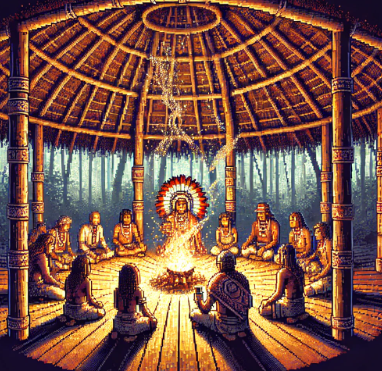
How Ayahuasca Heals Through Revisiting Trauma
Imagine sitting in the dimly lit maloca, the air thick with the scent of sacred herbs, the rhythmic chanting of the shamans resonating through your body. You’re not just here for a spiritual journey; you’re seeking healing. And then, as the potent brew of ayahuasca takes hold, you find yourself face-to-face with your deepest, most buried pain—memories you thought you’d left behind long ago. Could this uncomfortable, even terrifying, experience be the key to your healing?
Ayahuasca: A Journey into the Past
In recent years, psychedelic therapies have emerged as a beacon of hope for those grappling with trauma, particularly among military veterans. Among these therapies, ayahuasca—a traditional Amazonian brew used in spiritual ceremonies—has garnered attention for its profound effects on mental health. But the journey it takes you on is not just forward-looking; it’s a deep dive into the past, where participants often re-experience some of the most challenging moments of their lives.
This might sound daunting, even dangerous, especially for those with a history of trauma. However, a groundbreaking study has illuminated how this re-experiencing of adverse life events under ayahuasca can be both common and profoundly healing.
The Unexpected Power of Re-Experiencing Trauma
The study, which involved over 300 participants, including military veterans, sought to understand the prevalence and impact of re-experiencing traumatic events during ayahuasca ceremonies. The findings were striking: nearly 40% of participants reported re-living significant life traumas, such as sexual assault, combat-related injuries, or the loss of loved ones, during their ayahuasca sessions. For veterans, the rate was even higher.
But here’s where it gets interesting—rather than causing further harm, these re-experiences often led to profound healing. Participants who revisited their past traumas reported significant reductions in neuroticism, a personality trait associated with anxiety, moodiness, and emotional instability. In simpler terms, facing their worst memories helped them become calmer, more resilient, and less emotionally reactive.
Why Re-Experiencing Works
So, why does reliving these painful events under the influence of ayahuasca lead to healing rather than harm? The answer lies in the unique psychological environment that ayahuasca creates. Under its influence, the brain enters a highly suggestible state, where it becomes easier to reframe and reprocess traumatic memories.
Think of it like editing a movie. In everyday life, traumatic memories play out like a horror film on repeat, with no pause button. But under ayahuasca, you gain access to the director’s cut—you can revisit those scenes, change the script, and give them a different ending. This process is known as cognitive reappraisal, where you actively reinterpret the meaning of a traumatic event, often finding new, more positive perspectives.
For example, a veteran might re-experience a moment of intense combat, but instead of feeling overwhelming fear or guilt, they might come to see their actions in a new light—perhaps as a necessary part of their survival or as something they can now forgive themselves for. This shift in perspective can dramatically reduce the emotional weight these memories carry, leading to long-term psychological benefits.
The Role of Ceremony and Community
Another crucial element of ayahuasca’s healing power is the ceremonial context in which it’s taken. Unlike typical therapeutic settings, ayahuasca ceremonies are communal, deeply spiritual experiences guided by experienced shamans. The study found that these elements—ritual, community, and the presence of a trusted guide—played a significant role in the healing process.
Participants described how the ceremonial setting helped them feel safe and supported as they navigated their past traumas. The rituals, such as cleansing baths and sacred chants, served as anchors, helping them process difficult emotions and maintain a sense of connection to the present. This combination of re-experiencing trauma within a supportive, sacred space appeared to be key to the therapeutic outcomes observed.
Who Benefits Most?

The study also uncovered that certain groups, particularly women and veterans, were more likely to re-experience past traumas under ayahuasca. Women, for example, were more likely to relive experiences of sexual assault, while veterans often revisited combat-related traumas. Importantly, those with a self-reported diagnosis of post-traumatic stress disorder (PTSD) were also more prone to these re-experiences.
Yet, despite the initial discomfort, these groups also reported some of the most significant healing benefits. This suggests that while ayahuasca can be a challenging journey, it may be particularly beneficial for those who carry deep, unresolved trauma.
The Therapeutic Frontier
As psychedelic therapies continue to gain traction, understanding the role of re-experiencing trauma will be crucial. For clinicians and therapists, this means preparing patients for the possibility of revisiting difficult memories and ensuring they have the support needed to process these experiences safely.
Is it possible that the fear of confronting traumatic memories keeps them so powerful? If that’s the case, could controlled re-experiencing in a safe and supportive environment be the key to finally letting go of their grip? go of their grip?
A New Chapter in Healing
As more veterans, trauma survivors, and others seek out alternative therapies like ayahuasca, the potential for profound healing becomes ever more apparent. This study is just one piece of the puzzle, but it highlights a critical truth: healing often requires us to revisit the very things we most want to forget.
In doing so, we don’t just heal the wounds of the past—we transform them into the foundation of a stronger, more resilient future.
Let us know!
- Have you ever had an experience where confronting a painful memory led to unexpected healing or insight?
- What are your thoughts on the use of psychedelic therapies for trauma? Could this be a viable alternative to more conventional treatments?
Unlock Science Secrets:
Discover revolutionary research and innovative discoveries with ‘This Week in Science’! Designed for educators and science lovers, our free weekly newsletter offers insights that can transform your approach to science. Sign up now and deepen your understanding and passion for science. If you liked this blog, please share it! Your referrals help This Week in Science reach new readers.



